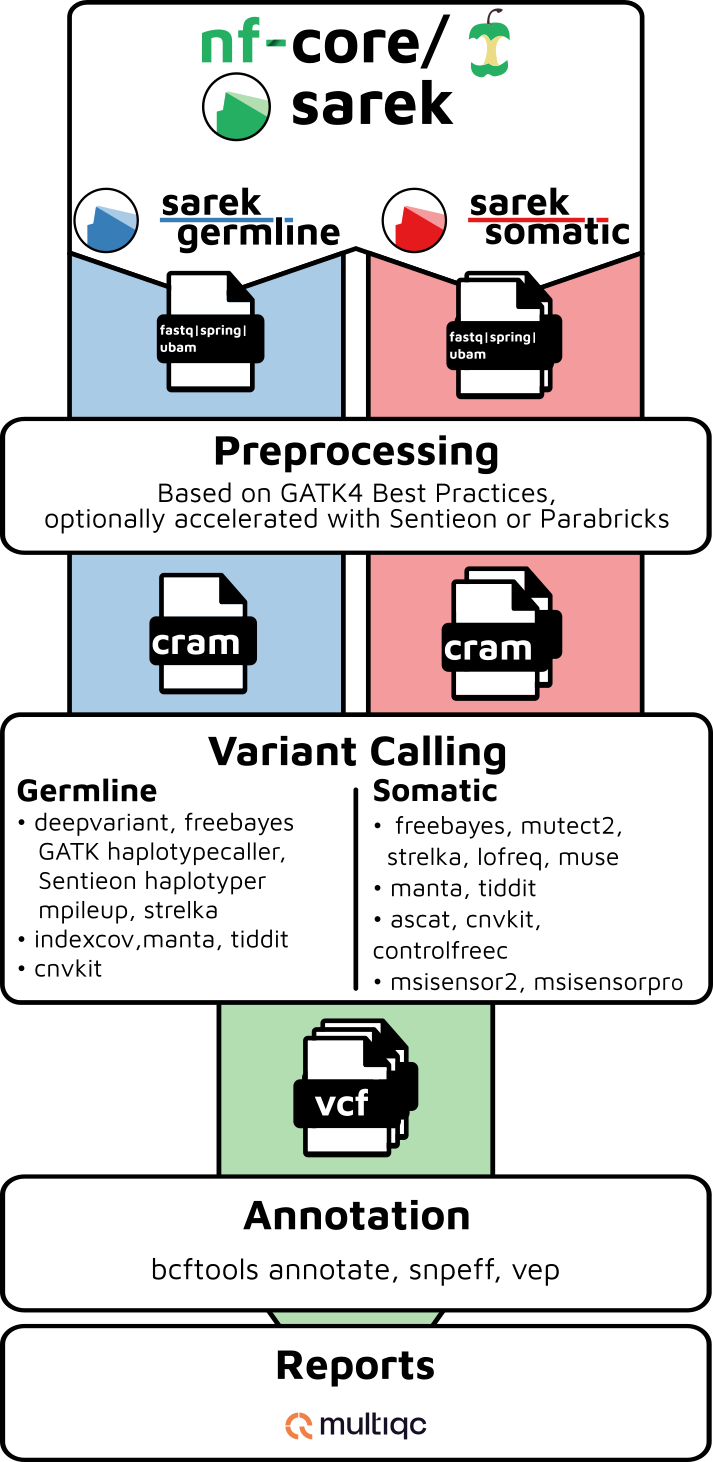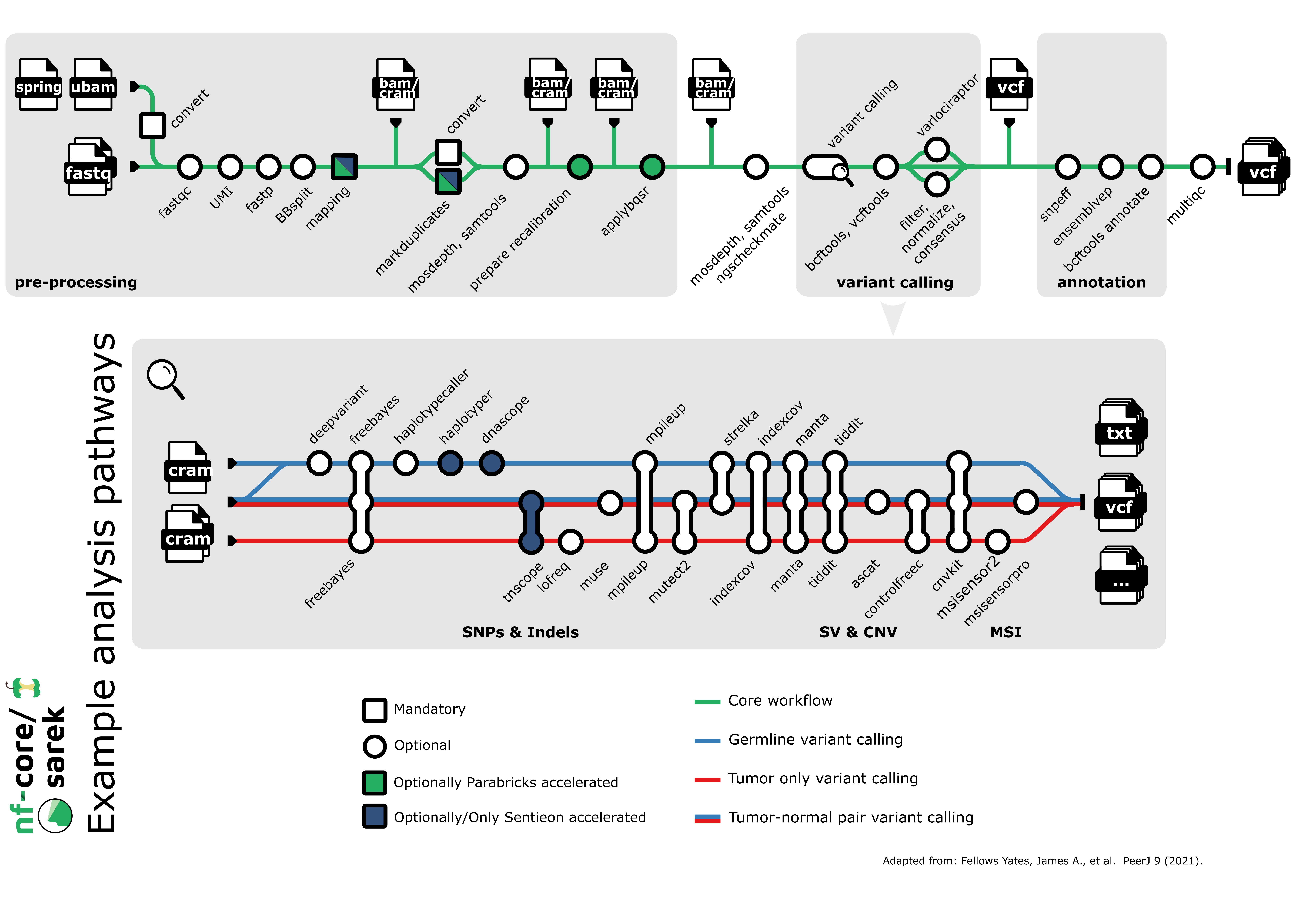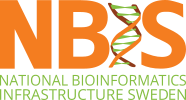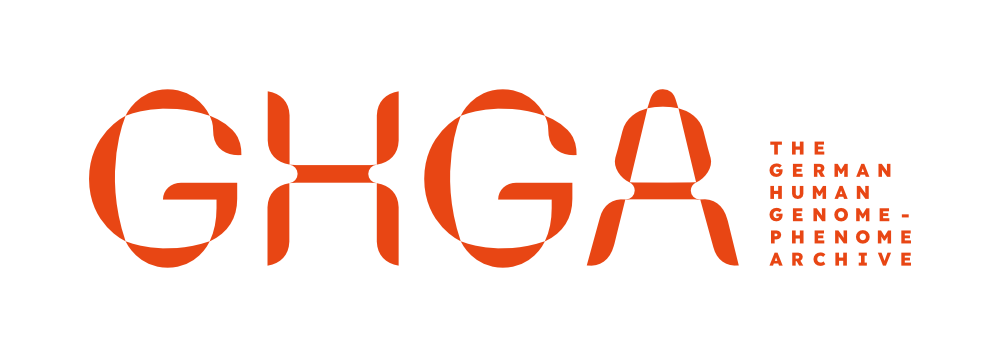nf-core/sarek
Analysis pipeline to detect germline or somatic variants (pre-processing, variant calling and annotation) from WGS / targeted sequencing
Introduction
nf-core/sarek is a workflow designed to detect variants on whole genome or targeted sequencing data. Initially designed for Human, and Mouse, it can work on any species with a reference genome. Sarek can also handle tumour / normal pairs and could include additional relapses.
The pipeline is built using Nextflow, a workflow tool to run tasks across multiple compute infrastructures in a very portable manner. It uses Docker/Singularity containers making installation trivial and results highly reproducible. The Nextflow DSL2 implementation of this pipeline uses one container per process which makes it much easier to maintain and update software dependencies. Where possible, these processes have been submitted to and installed from nf-core/modules in order to make them available to all nf-core pipelines, and to everyone within the Nextflow community!
On release, automated continuous integration tests run the pipeline on a full-sized dataset on the AWS cloud infrastructure. This ensures that the pipeline runs on AWS, has sensible resource allocation defaults set to run on real-world datasets, and permits the persistent storage of results to benchmark between pipeline releases and other analysis sources. The results obtained from the full-sized test can be viewed on the nf-core website.
It’s listed on Elixir - Tools and Data Services Registry and Dockstore.

Pipeline summary
Depending on the options and samples provided, the pipeline can currently perform the following:
- Form consensus reads from UMI sequences (
fgbio) - Sequencing quality control and trimming (enabled by
--trim_fastq) (FastQC,fastp) - Contamination removal (
BBSplit, enabled by--tools bbsplit) - Map Reads to Reference (
BWA-mem,BWA-mem2,dragmaporSentieon BWA-mem) - Process BAM file (
GATK MarkDuplicates,GATK BaseRecalibratorandGATK ApplyBQSRorSentieon LocusCollectorandSentieon Dedup) - Experimental Feature: Use GPU-accelerated parabricks implementation as alternative to “Map Reads to Reference” + “Process BAM file” (
--aligner parabricks) - Summarise alignment statistics (
samtools stats,mosdepth) - Variant calling (enabled by
--tools, see compatibility):ASCATCNVkitControl-FREECDeepVariantfreebayesGATK HaplotypeCallerGATK Mutect2indexcovLofreqMantampileupMSIsensor2MSIsensor-proMuSESentieon HaplotyperStrelkaTIDDIT
- Post-variant calling options, one of:
- Filtering (
bcftools view(default: filter byPASS,.)), normalisation (bcftools norm) and consensus calling (bcftools isec, default: called by at least 2 tools-n+2) on all vcfs and/orbcftools concatfor germline vcfs Varlociraptorfor all vcfs
- Filtering (
- Variant filtering and annotation (
SnpEff,Ensembl VEP,BCFtools annotate,SnpSift) - Summarise and represent QC (
MultiQC)

Usage
If you are new to Nextflow and nf-core, please refer to this page on how to set-up Nextflow. Make sure to test your setup with -profile test before running the workflow on actual data.
First, prepare a samplesheet with your input data that looks as follows:
samplesheet.csv:
patient,sample,lane,fastq_1,fastq_2
ID1,S1,L002,ID1_S1_L002_R1_001.fastq.gz,ID1_S1_L002_R2_001.fastq.gzEach row represents a pair of fastq files (paired end).
Now, you can run the pipeline using:
nextflow run nf-core/sarek \
-profile <docker/singularity/.../institute> \
--input samplesheet.csv \
--outdir <OUTDIR>Please provide pipeline parameters via the CLI or Nextflow -params-file option. Custom config files including those provided by the -c Nextflow option can be used to provide any configuration except for parameters; see docs.
For more details and further functionality, please refer to the usage documentation and the parameter documentation.
Pipeline output
To see the results of an example test run with a full size dataset refer to the results tab on the nf-core website pipeline page. For more details about the output files and reports, please refer to the output documentation.
Benchmarking
On each release, the pipeline is run on 3 full size tests:
test_fullruns tumor-normal data for one patient from the SEQ2C consortiumtest_full_germlineruns a WGS 30X Genome-in-a-Bottle(NA12878) datasettest_full_germline_ncbench_agilentruns two WES samples with 75M and 200M reads (data available here). The results are uploaded to Zenodo, evaluated against a truth dataset, and results are made available via the NCBench dashboard.
Credits
Sarek was originally written by Maxime U Garcia and Szilveszter Juhos at the National Genomics Infastructure and National Bioinformatics Infastructure Sweden which are both platforms at SciLifeLab, with the support of The Swedish Childhood Tumor Biobank (Barntumörbanken). Friederike Hanssen and Gisela Gabernet at QBiC later joined and helped with further development.
The Nextflow DSL2 conversion of the pipeline was lead by Friederike Hanssen and Maxime U Garcia.
Maintenance is now lead by Friederike Hanssen and Maxime U Garcia (now at Seqera)
Main developers:
We thank the following people for their extensive assistance in the development of this pipeline:
- Abhinav Sharma
- Adam Talbot
- Adrian Lärkeryd
- Àitor Olivares
- Alexander Peltzer
- Alison Meynert
- Anders Sune Pedersen
- arontommi
- BarryDigby
- Bekir Ergüner
- bjornnystedt
- cgpu
- Chela James
- David Mas-Ponte
- Edmund Miller
- Famke Bäuerle
- Francesco Lescai
- Francisco Martínez
- Gavin Mackenzie
- Gisela Gabernet
- Grant Neilson
- gulfshores
- Harshil Patel
- Hongwei Ye
- James A. Fellows Yates
- Jesper Eisfeldt
- Johannes Alneberg
- Jonas Kjellin
- José Fernández Navarro
- Júlia Mir Pedrol
- Ken Brewer
- Lasse Westergaard Folkersen
- Lucia Conde
- Louis Le Nézet
- Malin Larsson
- Marcel Martin
- Nick Smith
- Nicolas Schcolnicov
- Nilesh Tawari
- Nils Homer
- Olga Botvinnik
- Oskar Wacker
- pallolason
- Paul Cantalupo
- Phil Ewels
- Pierre Lindenbaum
- Sabrina Krakau
- Sam Minot
- Sebastian-D
- Silvia Morini
- Simon Pearce
- Solenne Correard
- Susanne Jodoin
- Szilveszter Juhos
- Tobias Koch
- Winni Kretzschmar
- Patricie Skaláková
Acknowledgements
Contributions & Support
If you would like to contribute to this pipeline, please see the contributing guidelines.
For further information or help, don’t hesitate to get in touch on the Slack #sarek channel (you can join with this invite), or contact us: Maxime U Garcia, Friederike Hanssen
Citations
If you use nf-core/sarek for your analysis, please cite the Sarek article as follows:
Friederike Hanssen, Maxime U Garcia, Lasse Folkersen, Anders Sune Pedersen, Francesco Lescai, Susanne Jodoin, Edmund Miller, Oskar Wacker, Nicholas Smith, nf-core community, Gisela Gabernet, Sven Nahnsen Scalable and efficient DNA sequencing analysis on different compute infrastructures aiding variant discovery NAR Genomics and Bioinformatics Volume 6, Issue 2, June 2024, lqae031, doi: 10.1093/nargab/lqae031.
Garcia M, Juhos S, Larsson M et al. Sarek: A portable workflow for whole-genome sequencing analysis of germline and somatic variants [version 2; peer review: 2 approved] F1000Research 2020, 9:63 doi: 10.12688/f1000research.16665.2.
You can cite the sarek zenodo record for a specific version using the following doi: 10.5281/zenodo.3476425
An extensive list of references for the tools used by the pipeline can be found in the CITATIONS.md file.
You can cite the nf-core publication as follows:
The nf-core framework for community-curated bioinformatics pipelines.
Philip Ewels, Alexander Peltzer, Sven Fillinger, Harshil Patel, Johannes Alneberg, Andreas Wilm, Maxime Ulysse Garcia, Paolo Di Tommaso & Sven Nahnsen.
Nat Biotechnol. 2020 Feb 13. doi: 10.1038/s41587-020-0439-x.






